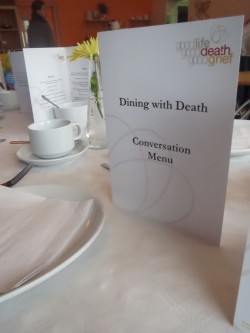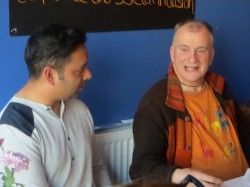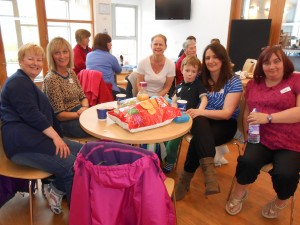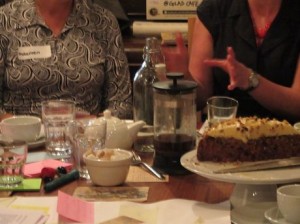News
Dining with Death at the Fringe
 This August saw the first ever Dining with Death events held at the Edinburgh Fringe, giving people the opportunity to chat to interested strangers in a light-hearted manner about death, dying and bereavement.
This August saw the first ever Dining with Death events held at the Edinburgh Fringe, giving people the opportunity to chat to interested strangers in a light-hearted manner about death, dying and bereavement.
Around 40 people attended the two events, where diners worked their way through the Dining with Death Conversation Menu. People tackled topics such as 'Is there really a taboo about death, dining and bereavement in Scotland?'; 'What things do you think make for a 'good death'?' and 'How would you like to be remembered?'.
The conversation menu was accompanied by a three-course meal of traditional Sikh funeral food provided by Punjabi Junction, a community café set up to empower Sikh and other ethnic minority women and their families. The events were co-facilitated by Good Life, Good Death, Good Grief and the 100% Project, a community engagement project which aims to start conversations about death, dying and bereavement in a life-affirming way.
 The popularity of the events challenges the notion that people in Scotland are reluctant to talk about death. In the words of some participants:
The popularity of the events challenges the notion that people in Scotland are reluctant to talk about death. In the words of some participants:
"Wonderful! Great tea, great food - I loved it!"
"I realised how much I love life, what I love about it and what I need to do to make it more vivid for now."
"Amazing! Please keep going!"
The two events - billed as Tea, Cake or Death? Death Cafe - were part of the Just Festival, which aims to provide a platform for people to explore their own spirituality by engaging with other people's to promote peace.
Talking about death over food is a growing trend. In Europe and the US, there is a thriving Death Café movement, where people "come together in a relaxed and safe setting to discuss death, drink tea and eat delicious cake". In the USA, the recently established Death over Dinner project hopes to create communal dialogues around death, healthcare and human life.
 The Dining with Death conversation menu was used for the first time at the launch of Good Life, Good Death, Good Grief in November 2011. Sixty people with various interests and backgrounds were invited to Howie's Restaurant in Edinburgh to experience first hand the positive effects of talking about death with strangers. Since then the menu has also been used at education events for NHS professionals, and to facilitate family discussions about end of life wishes.
The Dining with Death conversation menu was used for the first time at the launch of Good Life, Good Death, Good Grief in November 2011. Sixty people with various interests and backgrounds were invited to Howie's Restaurant in Edinburgh to experience first hand the positive effects of talking about death with strangers. Since then the menu has also been used at education events for NHS professionals, and to facilitate family discussions about end of life wishes.
Rebecca Patterson, Policy & Communications Manager at Good Life, Good
 Death, Good Grief said:
Death, Good Grief said:
"At Good Life, Good Death, Good Grief we believe that problems are caused in Scotland because people are unprepared for the experiences of death, dying and bereavement and don't know how to support each other through these difficult times.
"Talking about and being open about these issues can help. The Dining with Death menu was designed to act as an inspiration and an ice-breaker - to give people
permission, and help people get started on what is often perceived as a taboo subject.
"The atmosphere at Tea, Cake or Death? was friendly, warm and welcoming - people were enjoying themselves. Everyone has their own story to share - their own thoughts, feelings, concerns and experiences. Perhaps what we lack in Scotland isn't the willingness, but the right opportunities to talk about death."
Aberdeen opens up
A group of individual members of Good Life, Good Death, Good Grief from Aberdeen got together at the Bon Accord Centre on Sunday 18th May 2013 armed with a Before I Die wall, lots of information for people to take away, and time to talk and listen.
Vanessa Smith, Humanist Celebrant and member of GLGDGG said:
"We had been warned that the people of the
North East of Scotland would not be open to even thinking about, never mind
talking about, end of life issues. What we found flew straight in the face of
this and we had the most profound, moving, funny, deep, beautiful, sometimes
painful, sometimes euphoric encounters with people we have never met before!
"As a group of individual volunteers from different backgrounds we all had different perspectives on the problems that can be created by avoiding the topic of death. We wanted to get the people of the North East thinking, talking and making choices and decisions while life is good so that when there are tough times it is easier for everyone."
And talk, think, laugh and share they
did! Between
9am and 4pm over 200 people got involved by writing on Before I Die walls
and over 120 took part in an end of life worries survey.
People of all ages, cultures and backgrounds took part from tiny tots to folk of 93. People wrote in English, Scots, Doric, French, Polish, Arabic and Cantonese! There were even two marriage proposals!
Many people had taken action already such as writing wills, sorting out power or attorney or considering organ donation however many had not and took material away. There were many people who had thought about the end of their life but a common thread was that they had not actually discussed what they wanted with anyone. At least two people left with the intention of writing their wishes down to be found in the event of their death – they did not feel comfortable discussing it but at least they could help those they love who would be left behind by leaving some guidance.
Many had a lovely time reading the comments others had left. Lots of photos were taken on mobile phones and uploaded to Facebook and the people of the North East really opened up.
Big Picnic for the Widowed and Young
The adults and children of WAY (Widowed and Young) Group along with friends held their first Big Picnic Dunfermline on Sunday 19 May.
 Originally planned for Pittencrieff Park, wet weather forced the picnic into Dunfermline East church instead. A great time was had by all
with the older children playing rounders and football; and the soft
play proving very popular with the younger children.
Face painting was also available - not
only for the children but some adults too!
Originally planned for Pittencrieff Park, wet weather forced the picnic into Dunfermline East church instead. A great time was had by all
with the older children playing rounders and football; and the soft
play proving very popular with the younger children.
Face painting was also available - not
only for the children but some adults too!
WAY is a national charity for those bereaved before their 51st birthday, either married, unmarried or gay, with branches all over the UK to enable young widows/widowers to support and advise each other through peer to peer support, online forums. The local groups hold regular meals, meet ups and outings.
For more information about the charity see www.widowedandyoung.org.uk, e mail to info@widowedandyoung.org.uk, or phone 0300 012 4929.
Glad to be Alive: Final Fling's first Death Cafe
12 people and two hosts came together in Glasgow's funky southside Glad cafe on 14 May during Death Awareness Week to talk life and death.
Barbara Chalmers and Erin Scrutton from Final Fling facilitated the event. Visitors came from Glasgow, Edinburgh, Fife - even Melbourne, Australia!
Central to the chat was coffee and cake. There was talk about the words, thoughts, phrases that come up for people when they think about death. People discussed how our views of death affect how we live our life. Everyone was asked to write a promise to themselves about how they want to live their life... a wee surprise at some point after the event when it plops on the doormat!
 WHAT PARTICIPANTS
SAY:
WHAT PARTICIPANTS
SAY:
Friendly... sharing... interesting... thought-provoking... reflective...
validating... comforting... funny... positive ... joyful... moving... warm...
inspirational... sad... open... knowledgeable... frank
Here's what participants said in their feedback:
'Validated how I already feel about death, having had a positive experience with palliative care at home'
'I'm more enthusiastic and interested in how to take more control'
'It's broken the taboo'
'Thought-provoking. Made me want to contemplate some of the thoughts and ideas shared.'
'I've spent so much time thinking about death lately; I'm kind of sick of myself. It has reminded me to get my act together more and get on with life'
Final Fling plan on holding more death cafes in the future - check out their website for more details.
People of Nairn inspired to live life to the full
Dying to Know?, a joint initiative by Nairn Citizens Advice Bureau and NHS Scotland, was well received in Nairn last week - fantastic given the lure of the sun and the Harbour Fest.
The organisers were delighted with the positive response from visitors with comments such as "Good to see a place where death is talked about openly", "Friends were reluctant to accompany me: they thought it was 'goulish' - rubbish!", "We would certainly attend a follow-up day."
The 20 businesses and organisations who brought displays of their services and gave advice to visitors were also really positive and have offered to do it again! A DVD of the day will be produced to inspire other communities to do something similar.
The event reached 250 people with some travelling from Inverness, the Borders and Huntly. The "different kind of family day out" attracted national publicity from the Scotsman and the Sun indicating the significance of the subject to everyone. The organisers would have liked to see more younger people coming along to get information about putting their affairs in order as, with nearly 20% of people dying in the Highlands being under 65 years old, it is so important for families to be protected from hardship. The children who did come enjoyed the activities on offer and took it all in their stride.
Kate Clark, one of the organisers said " We organised this event to give people the chance to leave their lives as a gift to their families, rather than a burden, and the response has confirmed that it really is possible to feel better about our lives by thinking about our deaths. It is something that does not take a long time, especially with the help available, but has a lasting impact on our well-being."
The Before I Die wall was also a great hit in the community centre, with people of all ages taking part. Noticeable on the comments was that so many of them were achievable so hopefully this short consideration of their death will inspire Nairnites to get out and live their lives to the full. The "wall" has now been cleaned for the last time but Nairn's contribution to the global project will remain forever on beforeidie.cc.
The organisers urge anyone who could not make it along to the day to come along to Nairn Citizens Advice Bureau at any time to obtain free, confidential advice and to discuss their options with an adviser. A follow up meeting - Cake and Questions, about death and dying - will be held in the URC hall on 24th August 2013 at 11am for everyone interested in talking about death, finding out about practicalities and taking some of the fear away from the inevitable consequence of our well-lived lives.